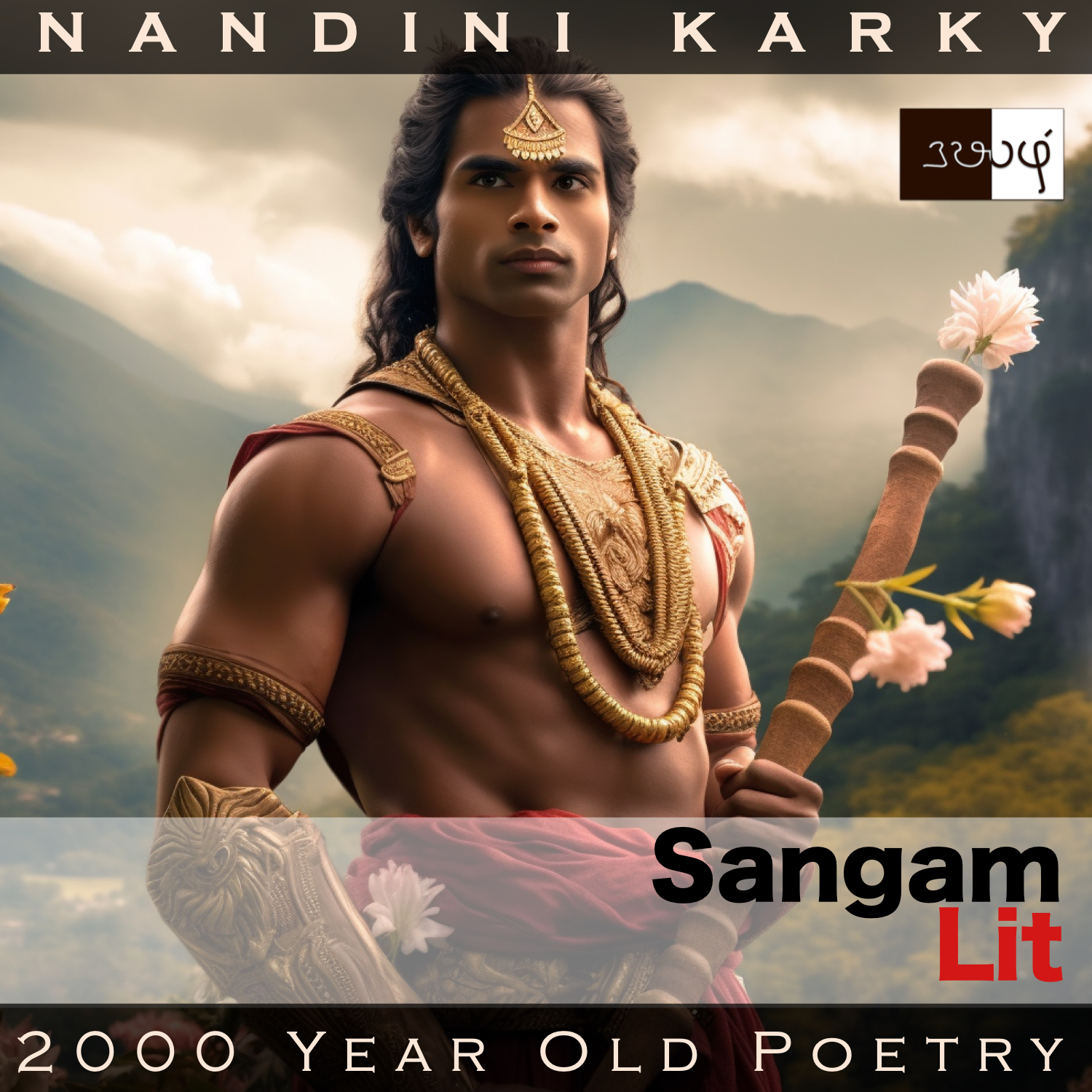Podcast: Play in new window | Download
Subscribe: Apple Podcasts | Spotify | Amazon Music | Android | iHeartRadio | Email | TuneIn | RSS | More
In this episode, we listen to a glowing tribute to a leader from the mountains, as portrayed in Sangam Literary work, Puranaanooru 157, penned about the local leader Eraikkon by the poet Kuramakal Ilaveyini. The verse is situated in the category of ‘Paadaan Thinai’ or ‘Leader’s praise’ and speaks about the qualities of the leader and his land.

தமர் தற் தப்பின் அது நோன்றல்லும்,
பிறர் கையறவு தான் நாணுதலும்,
படைப் பழி தாரா மைந்தினன் ஆகலும்,
வேந்துடை அவையத்து ஓங்குபு நடத்தலும்,
நும்மோர்க்குத் தகுவன அல்ல; எம்மோன்,
சிலை செல மலர்ந்த மார்பின், கொலை வேல்,
கோடல் கண்ணி, குறவர் பெருமகன்
ஆடு மழை தவிர்க்கும் பயம் கெழு மீமிசை,
எல் படு பொழுதின், இனம் தலைமயங்கி,
கட்சி காணாக் கடமான் நல் ஏறு
மட மான் நாகு பிணை பயிரின், விடர் முழை
இரும் புலிப் புகர்ப் போத்து ஓர்க்கும்
பெருங் கல் நாடன் எம் ஏறைக்குத் தகுமே.
A unique song that introduces us to a local leader from the ‘Kurinji’ regions or mountain lands. This female poet identifies Erai as the leader of her region. Her words can be translated as follows:
“Being tolerant of the mistakes made by one’s own kin, feeling regretful for the helplessness of others, never being the cause of shame in an army engaged in battle, walking with dignity in the court of great kings – These are attributes that do not fit your leaders, but are meant only for my leader, who has a wide chest, well-suited to wield a mighty bow, bears a killer spear and wears a garland of glory lilies – He, who is the chief of our hill people, the lord of the huge mountains, in whose domain, the towering formidable peaks impede swaying rain clouds, and when the day ends, being lost from its herd, unable to see its home, a handsome male deer calls out to its naive mate, making a huge tiger, lying in a cave in the mountain cleft, prick its ears in response.”
Time to explore the nuances here. The poet starts by listing the characteristics of great men and says these are, not minding the mistakes of those close to us, feeling down about the helplessness of others, being blameless in battle and dignified in the court of kings. Let’s delve in detail into each of these attributes in a short while. Before we do, we’ll understand why the poet has listed the same. We learn that this is to declare to someone that such noble qualities are not fitting for that person’s leader. However, these were perfect for her leader, Erai, the lord of the mountains. From there, she goes on to describe how their chief has a broad chest, perfect for placing a bow and aiming a speeding arrow. Not only that, he holds in his grasp, a powerful spear, and further, his land is identified by the garland of glory lilies he wears. From the physical descriptions of this leader, she moves on to his land and talks about how those peaks stop rain clouds in their track, and gives us a geography lesson on windward side and leeward side of this mountainous region. To talk further about the life in that land, she brings to spotlight a male deer that’s lost from its herd at twilight, calling out to its mate. Hearing this call, a tiger lying in its cave looks up intently, concludes this poet.
The feminine touch of the poet is evident in her rendition of the land of this leader, by sketching the place and time so vividly with elements of wildlife and weather, something that reminds me of the ‘Aham’ verses of Natrinai and Kurunthogai. Moving on to those qualities that are said to be befitting her great leader, we see how the very first one is about being forgiving. If a leader was to hold grudges and feel affronted at everything, he would never have the support of the people, the verse seems to imply. The next is a curious quality of feeling ashamed about the helplessness of others. We have to go deeper into this statement to understand that this sense of shame or sorrow comes from a feeling in the leader that no one he knows should suffer in need because of their poverty, and that’s what impels them to go in search of wealth and give to the needy. To gain that wealth, the leader leaves his lush domain and fights in the battles of greater kings, and here, he’s celebrated for his valour, and finally, that appreciation makes the leader walk with head held high in the court of the greatest rulers of the land. And through this verse, we understand the logic that made leaders of small tribes leave their region and go fight in the battles of kings, who controlled larger domains in ancient Tamil land. More importantly, we perceive the exact qualities that was considered noble about a leader in the eyes of his followers!




Share your thoughts...